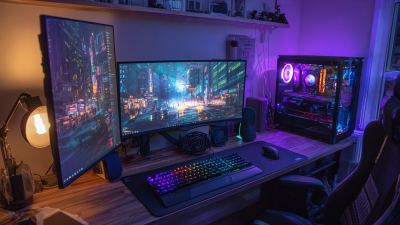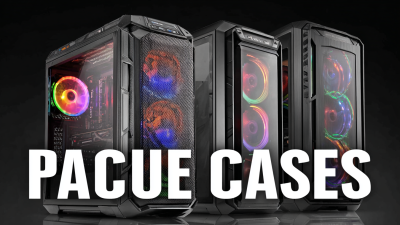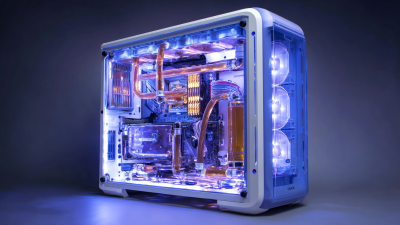Leave Your Message
- Phone
- E-mail
- Whatsapp


In today's rapidly evolving industrial landscape, choosing the right Cooling System Manufacturers for your business is crucial for maintaining efficiency and reliability in your operations. With numerous options available in the market, it becomes imperative to understand the various factors that contribute to the selection process. This guide aims to provide invaluable insights into the essential criteria that should influence your decision, from evaluating the technological advancements and product offerings of manufacturers to considering their reputation, customer service, and compliance with industry standards.

Whether you are looking for energy-efficient solutions or bespoke cooling systems tailored to your specific needs, understanding these components will empower you to make an informed choice. Join us as we delve into the ultimate strategies for identifying and partnering with the right cooling system manufacturers to ensure your business thrives in a competitive environment.
When selecting the right cooling system manufacturers for your business, several key factors come into play. First, understanding the different solutions available in the data center cooling market is crucial. With the global data center liquid cooling market projected to grow from USD 5.38 billion in 2024 to an estimated USD 17.77 billion by 2030, businesses should prioritize manufacturers that specialize in liquid cooling systems. These solutions not only enhance energy efficiency but also promise better thermal management, which is essential given the rising heat loads from modern IT equipment.

Another important consideration is the manufacturer's experience and innovation in the field. As AI technology continues to drive the demand for data centers, manufacturers must evolve with trends like solid-state cooling and economizer systems. Ensuring that your chosen manufacturer has a robust development pipeline and a history of incorporating state-of-the-art technology can lead to a more sustainable and scalable cooling solution. Additionally, evaluating the environmental impact and energy efficiency of the cooling systems offered will align your business with the broader industry shift towards sustainability, particularly amid the transition towards electric vehicle technologies and energy-efficient infrastructure.
The landscape of cooling systems is rapidly evolving, driven by innovative technologies that shape not only efficiency but also sustainability. With the rise of advanced water management solutions, data centers are finding ways to optimize their cooling processes, ultimately enhancing operational efficiency while reducing costs. These systems prioritize sustainability, providing a pathway for facilities to minimize their environmental impact amidst growing concerns over energy consumption and resource management.
Artificial intelligence is playing a crucial role in this transformation, enabling smarter HVAC systems that adapt to real-time conditions and improve energy management. The integration of predictive analytics and intelligent automation is revolutionizing how cooling systems operate, ensuring they are both responsive and efficient. As the industry moves toward more automated and AI-driven solutions, businesses can expect not only significant cost savings but also a reduction in their carbon footprint, aligning with global sustainability goals. The future of cooling systems looks promising, leveraging innovative technologies to meet the demands of a greener world.
When selecting a cooling system manufacturer for your business, evaluating their reputation and industry experience is paramount. According to a recent report by MarketsandMarkets, the global cooling systems market is projected to reach $202.2 billion by 2025, indicating that high-quality manufacturers are increasingly crucial for businesses aiming to enhance efficiency and sustainability. Companies with a robust reputation often have a proven track record of innovation and reliability, factors that can impact long-term operational success.
Industry experience, defined by years in the market and diverse project portfolios, can significantly influence the quality of cooling systems offered. A survey conducted by Frost & Sullivan revealed that firms with over ten years of experience are 35% more likely to provide tailored solutions that meet specific client needs. This experience often translates into extensive industry knowledge, enabling manufacturers to offer insights on energy efficiency and compliance with evolving regulatory standards, thereby ensuring that your cooling systems are not only effective but future-proof.
 In today's environmentally conscious market, selecting manufacturers who prioritize sustainability in their cooling system production is crucial. Over 80% of consumers report that they consider environmental impact when making purchasing decisions, according to a recent industry report by Statista. Manufacturers with robust sustainability practices not only reduce their carbon footprint but also enhance their brand reputation and customer loyalty.
In today's environmentally conscious market, selecting manufacturers who prioritize sustainability in their cooling system production is crucial. Over 80% of consumers report that they consider environmental impact when making purchasing decisions, according to a recent industry report by Statista. Manufacturers with robust sustainability practices not only reduce their carbon footprint but also enhance their brand reputation and customer loyalty.
When assessing potential cooling system manufacturers, prioritize those that implement energy-efficient technologies in their products. For example, the U.S. Department of Energy states that energy-efficient systems can reduce energy consumption by 20-50%, leading to significant cost savings over time. Additionally, inquire about their sourcing of materials; look for manufacturers who use recycled or sustainably sourced components, aligning with global trends towards circular economy practices.
Tips: Always request detailed information on a manufacturer's sustainability certifications, such as ISO 14001 or LEED. Furthermore, assess their commitment to reducing greenhouse gas emissions by asking about their long-term goals. By choosing manufacturers who engage in these practices, your business not only contributes positively to the environment but also positions itself as a forward-thinking leader in the industry.
When selecting a cooling system manufacturer for your business, the balance between cost-effectiveness and quality is crucial. While it may be tempting to opt for the cheapest option available, this can lead to future expenses due to subpar performance and frequent repairs. Understanding your specific needs and the environment in which the cooling system will operate can help in making an informed decision.
**Tip 1:** Conduct a thorough analysis of your budget versus the long-term costs of ownership. Sometimes, investing more upfront can save you from costly repairs and inefficiencies later on, making it a smart financial move.
**Tip 2:** Research the manufacturer's reputation in terms of both quality and service. Look for reviews and case studies from other businesses in your industry. A manufacturer known for quality production—and great customer service—can provide peace of mind that your investment is safeguarded.
Striking the right balance requires careful consideration of these factors. A high-quality system may come at a higher price, but its reliability and efficiency can greatly enhance your operations, ultimately leading to greater savings and productivity in the long run.
| Criteria | Cost-Effectiveness | Quality | Overall Rating |
|---|---|---|---|
| Energy Efficiency | High | Medium | 7/10 |
| Durability | Medium | High | 8/10 |
| Initial Cost | Low | High | 6/10 |
| Maintenance Cost | Medium | Low | 7/10 |
| Performance Under Load | Medium | High | 8/10 |
| Warranty Period | Short | Long | 6/10 |






